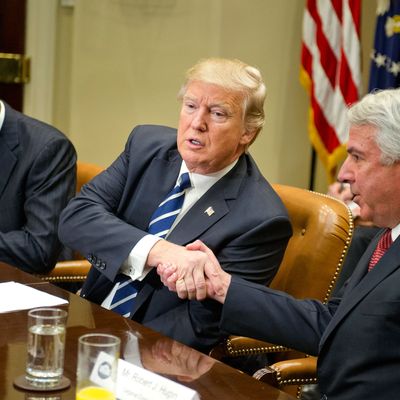
Without much question, the recent moment when Donald Trump showed the most independence of (or possible ignorance of) conservative economic orthodoxy was during his big pre-inaugural press conference on January 11, when in a ramble about industries leaving America he suddenly said something that freaked out many listeners and tanked pharmaceutical stocks:
I think a lot of industries are going to be coming back [to the U.S.]. We have to get our drug industry coming back. Our drug industry has been disastrous. They’re leaving left and right. They supply our drugs, but they don’t make them here. To a large extent. And the other thing we have to do is create new bidding procedures for the drug industry because they’re getting away with murder.
Pharma has a lot of lobbies, a lot of lobbyists, and a lot of power. And there’s very little bidding on drugs. We’re the largest buyer of drugs in the world, and yet we don’t bid properly. And we’re going to start bidding and were going to save billions of dollars over a period of time.
So today the president met with some of those very lobbyists and their bosses, and came out singing a very different song, which had a very different impact on pharma stocks:
Trump promised to slash regulations, get new treatments to market faster at the Food and Drug Administration, and increase international competition. “We’re going to streamline FDA; we have a fantastic person” that will be announced to lead the agency soon, Trump said. He also promised to cut taxes on business and lure companies back to the U.S.
Investors responded positively to those comments, and the Nasdaq Biotechnology Index was up 1 percent at 10:07 a.m. in New York, while the Standard and Poor’s 500 Pharmaceuticals, Biotechnology & Life Sciences Index rose 0.8 percent.
Trump also spoke vaguely of drug prices being too high, and of the need for “bidding,” which some observers apparently think was a veiled threat to revive the stick of government drug negotiations if the carrot of deregulation and lower taxes didn’t work. But it is hard to interpret some of these comments as anything less than an abandonment of what he said on January 11:
I’ll oppose anything that makes it harder for smaller, younger companies to take the risk of bringing their product to a vibrantly competitive market. That includes price-fixing by the biggest dog in the market, Medicare, which is what’s happening.
“Price-fixing” is precisely how pharma and its conservative allies describe Medicare negotiations for better drug prices. It sure sounds like Trump heard pharma’s talking points and adopted them.
And that’s why this incident has implications beyond the immediate issue, important as it is. Ezra Klein understood it right away:
On most of the big public policy issues of the day, Trump is a very conventional Republican. And on those issues where he hasn’t been conventional, Republican Congress members and business executives feel confident they can turn him around. On some issues, they probably won’t. But on this issue, it seems like they did.
That belief, if it’s even partially true, is an enormous asset for those who want to tame the populist beast and turn Trump’s perpetual fury away from GOP-leaning business lobbies and toward anyone who wants to use government to solve problems other than insufficiently enormous corporate profits. Just send in some execs with some GOP pols and maybe you can turn the Boss around on nearly anything you don’t like! You know, silly stuff like “draining the swamp” in Washington.






























